For those who work and study at Case Western Reserve University, the motivation to lead goes beyond a desire to hold a title—it’s an opportunity to take action, build community and create space for others to thrive. For Black student leaders, it’s also a chance to honor those who came before them while paving a way for those who will follow.
Whether leading student organizations, advocating for social initiatives or mentoring the next generation, their contributions not only demonstrate the power of perseverance and resilience but also exemplify how those from various backgrounds contribute toward the university’s mission.
In recognition of Black History Month, The Daily spoke with five CWRU student leaders, who shared their campus experiences, inspirations and vision for the future.
Read on to learn about their academic journeys, challenges they’ve overcome, and the legacies they are building.
Biographies have been edited for clarity and length.
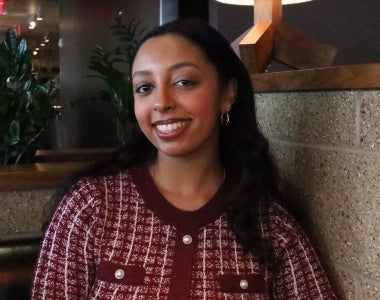
Lydia Abraham
President, Black Law Students Association
As the first in her family to attend college, Lydia Abraham is no stranger to navigating unfamiliar spaces in higher education. Now a second-year Juris Doctor candidate at Case Western Reserve University School of Law, she uses her experiences as a catalyst to set an example for her younger brothers.
“I want to show them that we belong in these spaces and that our presence matters,” Abraham shared.
While pursuing her studies, she found the most sense of community being part of the Black Law Student Association (BLSA), whose members support and encourage her to show up as her authentic self each day.
Today, Abraham uses her role as president to further the organization’s mission of helping Black law students develop their legal careers through academic workshops, social gatherings and peer mentorship.
“Law school can be a tumultuous journey, and I want everyone in my organization to feel supported,” she said.
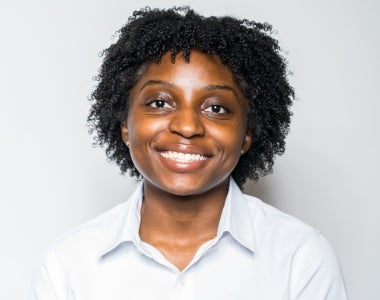
Nia Badley
Community relations coordinator, African American Society (AfroAm)
When fourth-year and first-generation student Nia Badley arrived at CWRU, she set her sights on Case School of Engineering, where she was drawn to the innovation and problem-solving of biomedical engineering.
Participating in the Emerging Scholars Program, Badley found herself captivated by a different kind of challenge—learning how structures, policies and other factors shape the world around her—which shifted her academic focus to pre-architecture and economics with a minor in social justice.
“My identity constantly reminds me that my journey is not just about me; it’s about the generations before me who fought for civil rights, education and opportunities for Black students,” she said. “Every step I take toward earning my degree is a tribute to their sacrifices.”
Once Badley had a grasp on her studies, she knew she wanted to do more than succeed academically—she wanted to build a sense of belonging for students like herself. This led her to get involved in AfroAm, where she uses music and food to connect with undergraduate students during hosted events.
“Representation matters not just in leadership, but in the built environment where communities thrive,” said Badley. “I plan to contribute to Black history and culture by ensuring that my work helps create welcoming spaces for all.”
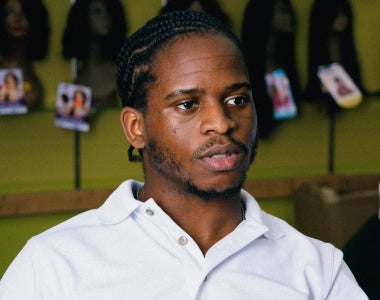
Anthony Chuka-Ipere
President, Polymer Student Organization
Third-year engineering student Anthony Chuka-Ipere’s journey began in Aba, Nigeria, though his family moved to the U.S. when he was just a year old. After studying in multiple cities—such as Atlanta, Columbus and eventually Houston—he developed a deep curiosity for science. It wasn’t until arriving at Case School of Engineering that Chuka-Ipere found his true passion: polymer science.
Beyond academics, Chuka-Ipere is deeply involved in campus life as treasurer of the African American Society (AfroAm), a resident assistant for University Housing, and a researcher in the Wnek Research Group, where he is determined to make the most of every opportunity and bring visibility to his major.
As he looks toward the future, Chuka-Ipere’s goal is clear: to open doors for those who come after him by giving polymer science and engineering students spaces to connect.
“The Nigerian and African communities at CWRU have definitely supported me while I’ve been here,” he said. “All of our successes are built off the backs of others who created opportunities for us.”
When he has a moment to take a break from his busy schedule, Chuka-Ipere cherishes moments that allow him to break his daily routine—such as the total solar eclipse in 2024.
“CWRU has a reputation for being a very serious college, and it is, but that day was perfectly unserious,” Chuka-Ipere shared.
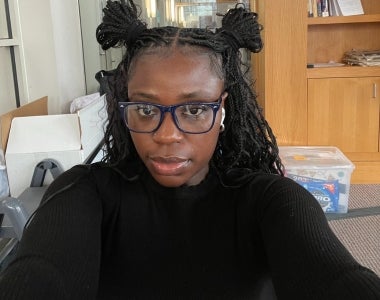
Raheal Neequaye
President, Street Law
Growing up in a Ghanaian household, second-year Juris Doctor candidate Raheal Neequaye was raised with strong values of community, perseverance and respect. Her family’s emphasis on hard work, education, and giving back led to Neequaye’s passion for advocacy and mentorship, which shapes how she navigates law school.
Through her studies and campus involvement, Neequaye not only hopes to use her legal career to advocate for marginalized communities—she wants to increase representation in the legal field and uplift future generations.
As president of Street Law, Neequaye’s focus extends beyond the Cuyahoga County Juvenile Court system, where she helps detained youth learn about relevant legal topics, such as discrimination, crime and domestic law.
“I strive to create spaces of support, representation and opportunity for those who, like me, are breaking barriers,” said Neequaye, who is also secretary for the Black Law Students Association. “Long-term, I want to use my legal expertise in health law to address disparities in Black maternal health and healthcare access, ensuring that policies reflect the needs of our communities.”
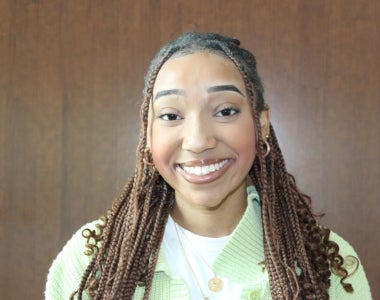
Aliyah Muhammad
Public relations chair, African American Society
As a child, Aliyah Muhammad saw firsthand how simple meals transformed gatherings and united members of her family.
“Food, faith and storytelling have been major influences in my life,” said Muhammad, who also cites her grandmother’s commitment to community as a motivator. “Food is a cultural connector and I’ve always been fascinated by its role in heritage, health and social change.”
Now a third-year nutrition student at Case Western Reserve University School of Medicine in the Didactic Program in Dietetics, Muhammad studies health disease disparities and prevention and how policy shapes public health outcomes.
At CWRU, Muhammad’s heritage also fuels her passion for advocacy and representation, which leads her to seek mentorship, community building and other opportunities that uplift students. As co-public relations chair for AfroAm, she plays a key role in amplifying student voices through social media outreach, event planning and creating opportunities for dialogue, celebration, and empowerment.

